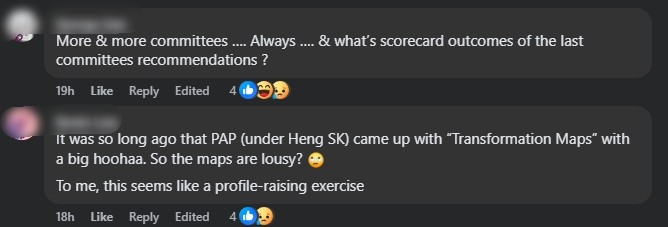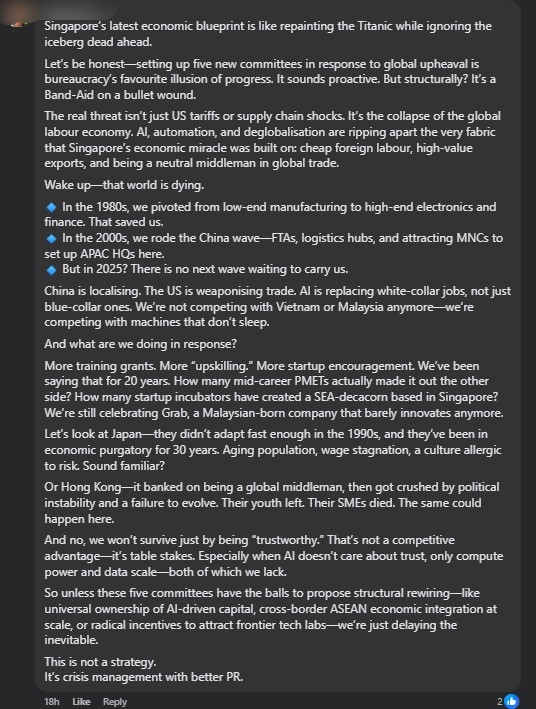On 4 August 2025, Deputy Prime Minister Gan Kim Yong announced that Singapore has initiated a comprehensive new strategy review (ESR) aimed at future-proofing its economy amid mounting geopolitical tensions and global disruptions.
The initiative includes the formation of five new committees, each tasked with addressing specific long-term challenges, such as the impact of United States tariffs and technological disruption.
Gan stated that the aim of this review is to “chart an economic blueprint that will enable us to stay globally competitive over the longer term, and, in doing so, secure good opportunities for Singapore and Singaporeans.”
However, comments observed online reflected confusion and scepticism, as netizens questioned the seemingly endless formation of committees in response to national challenges.
Many noted that the effectiveness of such committees in delivering concrete solutions remains unclear.
Citing examples such as US President Donald Trump’s unpredictable trade policies, they pointed out that global dynamics can shift dramatically within months, rendering lengthy reviews potentially obsolete.
Some Singaporeans called instead for bold, systemic reforms, expressing frustration with what they perceived as recycled approaches repackaged as new initiatives.
Singapore launches Economic Strategy Review to address US tariffs and tech disruptions
The review will centre on five priority areas.
These include strengthening Singapore’s position in the global economy, enhancing its start-up ecosystem, and ensuring resilience amid rapid geopolitical and technological changes.
Each committee will be co-led by two political office-holders and supported by members from the private sector, labour unions, and other key stakeholders.
In total, 10 office-holders will co-chair the committees, six of whom are newly elected Members of Parliament from the 3 May general election.
Committees to engage public and private stakeholders
Gan explained that the committees would consult with businesses, workers, and other stakeholders over the coming months.
An interim update is expected by early 2026, followed by a final report and recommendations by mid-2026.
The five committees will operate under the oversight of the Singapore Economic Resilience Taskforce (SERT), which Gan also chairs.
Replacing previous task force structure with wider review
The new committees replace the third workstream under SERT, which originally focused on long-term strategies.
Gan said this change reflects the volatile global environment, particularly the evolving nature of US tariffs.
“With the tariffs changing from month to month, sometimes from day to day, it is important for us to take a comprehensive review and not rush into a conclusion of what we should do in the longer term,” Gan said at a press conference held at The Treasury.
Providing an update on discussions with US counterparts, Gan confirmed that the Singapore Government remains engaged with American officials regarding the recently imposed 10 per cent tariff on Singaporean exports.
He stated that authorities are exploring “a practical arrangement” to maintain access to the US market, including the possibility of concessionary tariff rates.
However, he declined to provide further details, citing the ongoing nature of discussions.
Online reactions highlight concerns about effectiveness
Public reaction to the announcement has been mixed.
Observing comments across platforms such as CNA and The Straits Times’ Facebook pages, many netizens expressed scepticism regarding the creation of yet another set of committees.
Some users questioned whether the review was a means to test the capabilities of fourth-generation (4G) leaders in navigating turbulent times or even to identify potential fifth-generation (5G) core leadership.


There were also concerns about the Key Performance Indicators (KPIs) for these committees.
Netizens asked how the success of the committees would be measured and whether they would deliver tangible improvements—such as fewer retrenchments, lower unemployment, and better job placement for both graduates and senior professionals.

Several users pointed out that existing initiatives, such as the Industry Transformation Maps introduced by then Deputy Prime Minister Heng Swee Keat, were already in place.
Some questioned whether the introduction of new committees suggested those existing strategies had proven ineffective or insufficient in tackling today’s economic realities.
A comment criticised the new committees as potentially being “profile-raising exercises,” questioning their necessity and value.


Need for structural reform, not cosmetic change
One recurring sentiment was frustration with what was perceived as a recurring pattern—new committees, new labels, but similar strategies.
Some netizens called for fundamental reforms rather than “recycled responses dressed in new packaging.”
A widely shared comment stated that the real threats—AI, automation, and deglobalisation—are not being adequately addressed.
Concerns were raised that Singapore’s longstanding economic strengths are rapidly eroding, and that only bold, systemic change can safeguard its future competitiveness.

Concerns about inclusiveness and non-partisanship
Other users scrutinised the inclusiveness of the committees’ composition.
Some questioned whether opposition party members, particularly from the Workers’ Party, would be invited to participate in the review process.
These concerns reflect a broader public demand for more non-partisan and diverse perspectives in policy formulation.


Several netizens emphasised the need to include professionals such as scientists, engineers, economists, and artificial intelligence experts.
Another urged the Government to direct young people towards studying advanced disciplines such as physics and AI rather than encouraging social media-driven aspirations.
Rising cost of living and day-to-day challenges
Aside from policy and strategy concerns, netizens also voiced dissatisfaction over the rising cost of living in Singapore.
One comment pointed out that while the government blames external factors such as tariffs, everyday citizens continue to face increasing burdens.
Mention was made of rising Goods and Services Tax (GST), Certificate of Entitlement (COE) premiums, Housing and Development Board (HDB) flat prices, and cost of living (COL) levels.

“The recent trip by GKY was basically a taxpayer-funded expense with zero reduction in the 10% tariff,” one user alleged, expressing frustration with a perceived lack of results from high-level diplomatic engagements.
Despite the Government’s assurance that the review process is comprehensive and forward-looking, some remain doubtful, pointing hout that by the time they publish the recommendations in mid-2026, the economic pattern may already have changed —especially under Trump.


The post ‘More and more committees’: Netizens react as Singapore launches economic review amid US tariffs appeared first on The Online Citizen.


